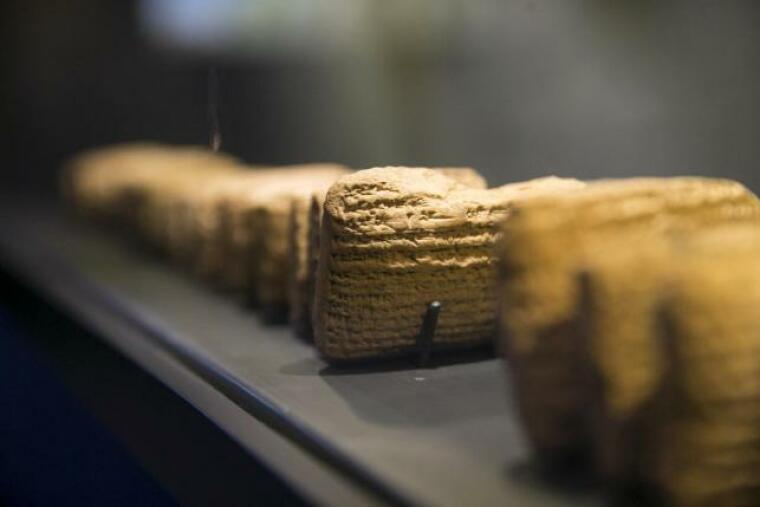Ancient Roman writing tablets found in London
The construction of Bloomberg's European headquarters in London has unearthed 405 ancient Roman writing tablets, including the earliest document of its time, depicting a clearer picture of Roman Britain.

Two years after the excavation in the three-acre site, the Museum of London Archaeology (MOLA) published on Wednesday, June 1 "Roman London's First Voices," a monograph of 88 translated tablets out of 405 writing tablets discovered in the Bloomberg site.
Many of the legible Bloomberg writing tablets, almost as big as the iPad, turned out to be financial documents, supporting what Tacitus the historian said in "Annals" that London was largely inhabited by businessmen. One document listed names of nearly 100 people of various professions such as judge, brewer, cooper, soldiers, slaves and freemen.
Roger Tomlin, the retired classics scholar of Oxford University and one of the main authors of the monograph who deciphered and interpreted the tablets, shared that one of the structures excavated may have been among London's earliest office buildings as 19 tablets were discovered at the location.
Tomlin's personal favorite among the discovered documents is also the earliest handwritten document and a promissory note dated January 8, A.D. 57.
"Not only is it the earliest dated document from Roman Britain, it was also comparatively straightforward to read," Tomlin told National Geographic. "I am always very pleased when I come across one like that."
The classicist and cursive Latin expert added, "[These tablets] provide some very personal glimpses into the lives of the first Londoners. Some of them are quite tantalizing."
"It's a bit like reading snippets of people's emails," added Sophie Jackson, a MOLA archeologist.
Jackson's personal favorite among the ancient tablets is the one that reads, "You will give this to Junius, the cooper, opposite the house of Catullus ..."
She described how the simple text captured her imagination and likened it to how one would text a friend in the present time.
"We think of it as our city now; we forget that it was once theirs," reflected Jackson.
Commenting on the complex task of reconstructing the ancient and fragmentary remains, Tomlin had this to say, "If you like doing sudoku, you'd love doing this."
 Christians don't have to affirm transgenderism, but they can’t express that view at work: tribunal
Christians don't have to affirm transgenderism, but they can’t express that view at work: tribunal Archaeology discovery: Medieval Christian prayer beads found on Holy Island
Archaeology discovery: Medieval Christian prayer beads found on Holy Island Presbyterian Church in America votes to leave National Association of Evangelicals
Presbyterian Church in America votes to leave National Association of Evangelicals Over 50 killed in 'vile and satanic' attack at Nigerian church on Pentecost Sunday
Over 50 killed in 'vile and satanic' attack at Nigerian church on Pentecost Sunday Ukrainian Orthodox Church severs ties with Moscow over Patriarch Kirill's support for Putin's war
Ukrainian Orthodox Church severs ties with Moscow over Patriarch Kirill's support for Putin's war Islamic State kills 20 Nigerian Christians as revenge for US airstrike
Islamic State kills 20 Nigerian Christians as revenge for US airstrike Man who served 33 years in prison for murder leads inmates to Christ
Man who served 33 years in prison for murder leads inmates to Christ


 Nigerian student beaten to death, body burned over ‘blasphemous’ WhatsApp message
Nigerian student beaten to death, body burned over ‘blasphemous’ WhatsApp message 'A new low': World reacts after Hong Kong arrests 90-year-old Cardinal Joseph Zen
'A new low': World reacts after Hong Kong arrests 90-year-old Cardinal Joseph Zen Iran sentences Christian man to 10 years in prison for hosting house church worship gathering
Iran sentences Christian man to 10 years in prison for hosting house church worship gathering French Guyana: Pastor shot dead, church set on fire after meeting delegation of Evangelicals
French Guyana: Pastor shot dead, church set on fire after meeting delegation of Evangelicals ‘Talking Jesus’ report finds only 6% of UK adults identify as practicing Christians
‘Talking Jesus’ report finds only 6% of UK adults identify as practicing Christians Mission Eurasia ministry center blown up in Ukraine, hundreds of Bibles destroyed: 'God will provide'
Mission Eurasia ministry center blown up in Ukraine, hundreds of Bibles destroyed: 'God will provide' Church holds service for first time after ISIS desecrated it 8 years ago
Church holds service for first time after ISIS desecrated it 8 years ago Burger King apologizes for 'offensive campaign' using Jesus' words at the Last Supper
Burger King apologizes for 'offensive campaign' using Jesus' words at the Last Supper Uganda: Muslims abduct teacher, burn him inside mosque for praying in Christ’s name
Uganda: Muslims abduct teacher, burn him inside mosque for praying in Christ’s name